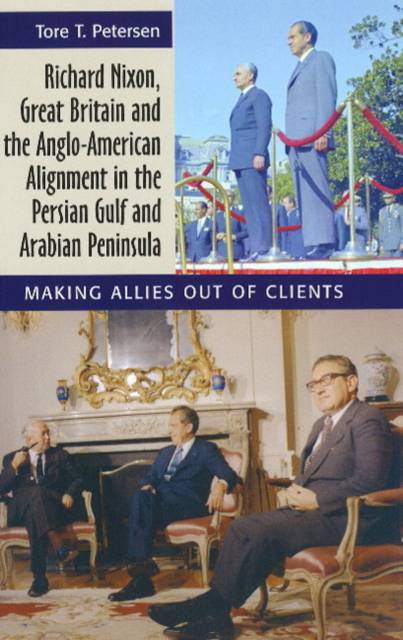
- Afhalen na 1 uur in een winkel met voorraad
- Gratis thuislevering in België vanaf € 30
- Ruim aanbod met 7 miljoen producten
- Afhalen na 1 uur in een winkel met voorraad
- Gratis thuislevering in België vanaf € 30
- Ruim aanbod met 7 miljoen producten
Zoeken
Richard Nixon, Great Britain and the Anglo-American Alignment in the Persian Gulf and Arabian Peninsula
Making Allies Out of Clients
Tore T Petersen
Paperback | Engels
€ 38,45
+ 76 punten
Uitvoering
Omschrijving
When the British Labour party announced the withdrawal of British forces from the Persian Gulf in January 1968, the United States faced a potential power vacuum in the area. The incoming Nixon administration, preoccupied with the Soviet Union and China, and the war in Vietnam, had no intention of replacing the British in the Gulf. To avoid further military commitments, the US encouraged Iran and Saudi Arabia to maintain area security. A critical policy decision, overlooked by most scholars, saw Nixon and Kissinger engineer the rise in oil prices between 1969 and 1972 to enable Saudi Arabia and Iran to purchase the necessary military hardware to serve as guardians of the Gulf. For all their bluster about reversing Labour's withdrawal decision, after their surprise victory in the election of June 1970 the Conservatives adhered to Labour's policy. But in contrast to Labour's wish to cut the umbilical cord of empire, the Tories wanted to retain influence in the Persian Gulf, pursuing policies largely independent of the US by the creation of the United Arab Emirates, deposing the sultan of Oman, and trying to solve the dispute over the Buraimi oasis with Saudi Arabia. By trying to maintain its empire on the cheap, Britain turned into an arms supplier supreme. But offering and selling arms does not a foreign policy make, leaving Britain in the long run with less influence in regional affairs. This was true also for the US, whose arms sales were to prove no realistic an alternative to foreign policy. The US hid under the Iranian security blanket for almost a decade. Given the weakness of the regime and the Shah's nonsensical dreams of turning Iran into one of the top five industrial and military powers in the world, the policy was cavalierly irresponsible. Similarly, leaving Saudi Arabia wallowing in oil money and medieval stupor -- a seedbed for Islamic fundamentalists -- created major future problems for the United States, as evinced by 9/11.
Specificaties
Betrokkenen
- Auteur(s):
- Uitgeverij:
Inhoud
- Aantal bladzijden:
- 172
- Taal:
- Engels
Eigenschappen
- Productcode (EAN):
- 9781845194666
- Verschijningsdatum:
- 21/02/2011
- Uitvoering:
- Paperback
- Formaat:
- Trade paperback (VS)
- Afmetingen:
- 155 mm x 227 mm
- Gewicht:
- 299 g

Alleen bij Standaard Boekhandel
+ 76 punten op je klantenkaart van Standaard Boekhandel
Beoordelingen
We publiceren alleen reviews die voldoen aan de voorwaarden voor reviews. Bekijk onze voorwaarden voor reviews.











